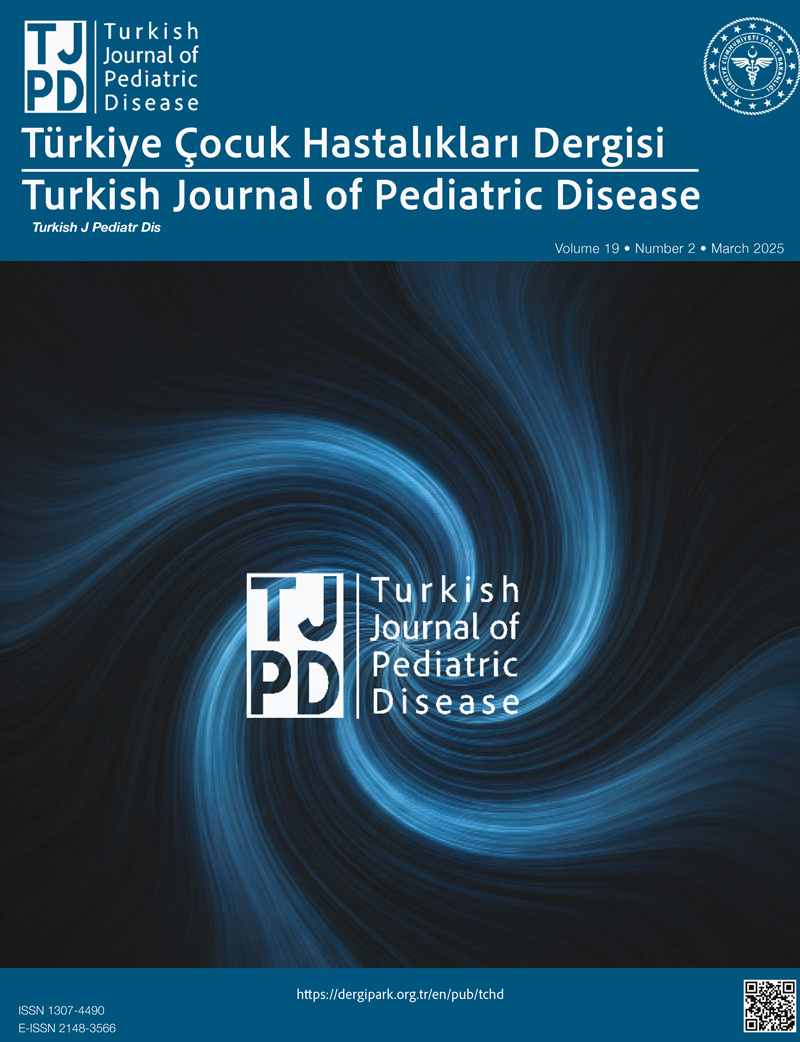Abstract
Objective: The aim of this study was to determine the dietary habits of patients with phenylketonuria (PKU) in different age groups, to assess energy, protein and phenylalanine intakes, and to evaluate dietary compliance and its effect on metabolic control.
Material and Methods: The study, conducted between 1 March 2022 and 30 September 2022, the study involved 20 children aged 2-18 diagnosed with PKU at the Department of Pediatric Metabolism Outpatient Clinic of Ankara Bilkent City Hospital. Participants were evaluated for diet compliance and had their blood phenylalanine and tyrosine levels were measured.
Results: Among the 20 patients, 42.9% (n=9) were female and 57.1% (n=11) were male, with a mean age of 4.7±3.22 years. Age distribution was 70% (n=14) aged 2-6, 20% (n=4) aged 6-10, and 10% (n=2) aged 10-13. Patients attended four follow-ups over six months. A moderate negative correlation was found between daily dietary phenylalanine and blood phenylalanine levels in the first and last controls, and a high negative correlation in the 2nd and 3rd controls (p=0.006, p<0.001, p<0.001, p=0.013). A positive moderate correlation was found between the frequency of daily amino acid mixture consumption and diet compliance (p=0.025). Increased meal frequency improved diet compliance. No significant relationship was found between blood phenylalanine levels and amino acid mixture consumption, diet compliance, or daily amino acid mixture consumption frequency.
Conclusion: In PKU, nutritional habits, daily phenylalanine intake and amino acid mixture consumption frequency impact dietary compliance and metabolic control. Lifelong medical nutrition therapy requires multidisciplinary team support, frequent follow-ups and adherence to the recommended diet.
Keywords: Metabolic control, phenyalanine, phenylketonuria
References
- Brown CS, Lichter-Konecki U. Phenylketonuria (PKU): A problem solved? Mol Genet Metab 2015;6:8-12.
- Koksal G, Gokmen H. Nutritional Therapy in Pediatric Diseases. Ankara: Hatiboglu Publishing; 2016.
- Vockley J, Anderson HC, Antshel KM, Braverman NE, Burton BK, Frazier DM, et al. Phenylalanine hydroxylase deficiency: diagnosis and management guideline. Genet Med 2014;16:188-200.
- Gencan G. Newborn Screening Programs. In: Current Debates in Health Sciences 2. Ankara: Platanus Publishing 2022:65-84.
- Gokmen Ozel H, Kucukkasap T, Koksal G, Kalkanoglu Sivri H, Dursun A, Tokatli A, et al. Does maternal knowledge impact blood phenylalanine concentration in Turkish children with phenylketonuria? J Inherit Metab Dis 2008;31:213-7.
- Van Spronsen FJ, Van Wegberg AM, Ahring K, Belanger-Quintana A, Blau N, Bosch AM, et al. Key European guidelines for the diagnosis and management of patients with phenylketonuria. Lancet Diabetes Endocrinol 2017;5:743-56.
- Aktac S, Akduman G, Kundakci S, Kargin D, Icen H. The effect of maternal nutrition behaviors on the nutritional status and behaviors of children with phenylketonuria. Turk J Pediatr Dis 2021;15:174-80.
- MacDonald A, Gokmen Ozel H, Van Rijn M, Burgard P. The reality of dietary compliance in the management of phenylketonuria. J Inherit Metab Dis 2010;33:665-70.
- McWhorter N, Ndugga-Kabuye MK, Puurunen M, Ernst SL. Complications of the low phenylalanine diet for patients with phenylketonuria and the benefits of increased natural protein. Nutrients 2022;14:4960.
- Camp KM, Parisi MA, Acosta PB, Berry GT, Bilder DA, Blau N, et al. The effect of improved dietary control on cognitive and psychiatric functioning in adults with phenylketonuria: The ReDAPT study. Orphanet J Rare Dis 2021;16:35.
- Ahring K, Belanger-Quintana A, Dokoupil K, Gokmen Ozel H, Lammardo AM, MacDonald M, et al. Blood phenylalanine control in phenylketonuria: a survey of 10 European centers. Eur J Clin Nutr 2011;65:275-8.
- Blau N, Van Spronsen FJ, Levy HL. Phenylketonuria. Lancet 2010;376:1417-27.
- Tandogan Z, Gultekin Bilgin M. Evaluation of dietary habits and food consumption levels of patients with phenylketonuria. Journal of Child 2022;22:191-9.
- Acosta P. PKU Nutrition Management Guidelines, Final Report. Genetic Metabolic Dietitians International, First Edition 2015.
- Akay Haci I. Factors affecting treatment adherence in patients with phenylketonuria. Specialist Thesis, Dokuz Eylul University Faculty of Medicine, Department of Pediatrics, Izmir 2016.
- Yilmaz O. Evaluation of dietary phenylalanine tolerance in individuals with phenylketonuria. Master’s Thesis, Hacettepe University Institute of Health Sciences, Ankara, 2017.
- Olsson GM, Montgomery SM, Alm J. Family conditions and dietary control in phenylketonuria. J Inherit Metab Dis 2007;30:708-15.
- Manta-Vogli PD, Dotsikas Y, Loukas YL, Schulpis KH. The phenylketonuria patient: A recent dietetic therapeutic approach. Nutr Neurosci 2020;23:628-39.
- Mlcoch T, Puda R, Jesina P, Lhotakova M, Sterbova S, Dolezal T. Dietary patterns, cost and compliance with low-protein diet of phenylketonuria and other inherited metabolic diseases. Eur J Clin Nutr 2018;72:87-92.
- Bayram S, Kanbur E. Compliance with diet and frequency of depressive mood in adolescents with phenylketonuria. Turk J Pediatr Dis 2021;15:518-25.
- Donat B. Compliance with diet and problems encountered in compliance with diet in phenylketonuria. Yeditepe University 2016.
- Alptekin IM, Cakiroglu FP. Challenges faced by phenylketonuria patients in social life: A qualitative study. ACU Journal of Health Sciences 2019;10:763-9.
- Top FU, Alemdar DK. The Difficulties of Families of Children with Phenylketonuria: A Qualitative Study. J Educ Res Nurs 2015;12:62-8.
- Gunduz M, Arslan N, Unal O, Cakar S, Kuyum P, Bülbül FS. Depression and anxiety among parents of phenylketonuria children. Neurosciences (Riyadh) 2015;20:350-6.
Copyright and license
Copyright © 2025 The Author(s). This is an open access article distributed under the Creative Commons Attribution License (CC BY), which permits unrestricted use, distribution, and reproduction in any medium or format, provided the original work is properly cited.






